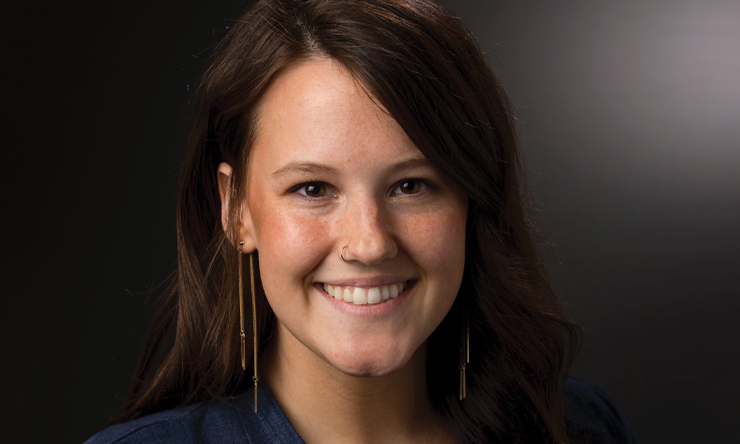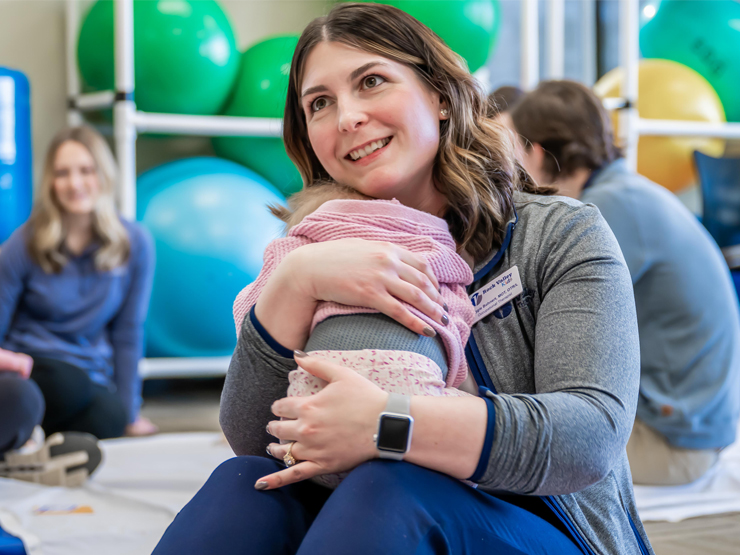After learning that St. Ambrose was seeking stories from graduates who are World War II veterans documenting their war experiences, cousins Raymond Walton '48, recently deceased, and Joseph Walton '50, Bloomfield, Conn., supplied their stories.
The Value of Hard Work
Arthur Gill '57, Tucson, Ariz., contributed this story from his college days
The year was 1955 or 1956, when I was at St. Ambrose College, Davenport, Iowa. Together with my classmates, I was sitting in the lecture hall, waiting for the professor who happened to be late.
Small talk centered on the general rule that if the instructor did not show up after 15 minuets, the class could feel free to leave.
Meanwhile, a school janitor was outside the room, mopping the hall, when one of the students made a smart-aleck remark, perhaps in well- meaning jest, but potentially hurtful none the less, that perhaps the janitor would be willing to deliver the lecture. This comment brought a few ill- considered bursts of laughter. What followed was unforgettable.
The custodian, looking up after hearing the remark and the laughter, laid his mop aside, looked at the class through the open door, then slowly walked to the podium. The class seemed quiet shocked, but snapped to attention. The message was simple yet strong. It went something like this:
When you invited me to speak, I know that you were not serious, but I do have a message for you students. When I was young I did not have the money to go to college, and due to financial and other considerations, I had to go to work early to help support my family. I never had the advantages you have now.
I think it is very important that you appreciate what opportunities you do have and that you make the most of them. I value what I do, and I do a good job at what I do, but my work won't take me as far as the heights you can reach, provided that you do not waste your chances and appreciate what has been given to you. That's my message to you.'
At that, he smiled, turned, left the podium and returned to his work.
You could have heard a pin drop. No one moved, and 15 minuets had by now come and gone. First a trickle, then a sincere burst of applause, filled the hall. It was the most memorable lecture of my years at St. Ambrose. I often think of that janitor, that day and that most valuable lesson.
Let us treasure the good work of all good people, and take this lesson to heart.
Lifelong Friendships Were Made
Current student Katie Voelliger wrote this account of the 50th class reunion of her grandmother, Katie Lampe, who was in the first class of "Mercy's Nursies."
Twenty-nine nurses graduated from St. Ambrose in May of 1954. They began their college education September 1951, in which was quite different then what it is today.
"It was a hostile environment, since we were the first class of women on campus. As time progressed, St. Ambrose found how compassionate and thoughtful we were," said Katie Lampe, one of the nurses. "I still believe we are one of the best assets to the college."
These nurses began their day on floor duty at the former Mercy Hospital, presently Genesis West. They worked at the hospital from seven until nine-thirty in the morning. Then they hurried over to the nurses home to get out of their white uniforms. After changing their clothes, the nurses trudged seven blocks to Ambrose to make their classes, which started at ten. Many of the nurses had to be back to the nurses' home for lunch by noon. After a short lunch break, floor duty was from one to four in the afternoon or four to seven in the evening.
The nurses walked everywhere; none of them drove. They also sang at the dedication of the Christ the King Chapel.
In 2004, the 22 nurses that are still living celebrated their 50th reunion in the Ed and Bobbi Rogalski Center over homecoming weekend.
"It was so different from when we attended classes at Ambrose. At the reunion, they welcomed us with open arms. I think as the years went on, they realized what a super group of girls we are," said Lampe.
Another nurse, Ann Dwyer, said, "It was like no time had passed. None of us had changed."
Many meetings, appointments, and arrangements were made for planning their great reunion. Steve Ahrens, Director of Alumni and Parent Relations, couldn't believe their memories for details.
"The class of 1954 nurses played a very important part of shaping St. Ambrose. We were proud to welcome them home," said Arhens.
Many of the nurses, especially Mary Jane Ungs, mentioned that it was a big success. Another one the of the nurses, Sandy Stolley, was happy they were in great health and could attend.
"We're just happy the nursing program is back where it belongs. And that's at Ambrose," said Lampe.
Such Gifts As Smiles
Tom Miller, a retired teacher and a novelist and essayist, contributed this story, a fond tribute to former History Professor Wayne DeJohn
I first met Wayne and Richard (Geiger) when I interviewed for a teaching job at a small Catholic college in eastern Iowa where I lived. It was only an adjunct position, teaching a couple of sections of U.S. history, but I was young and eager. I was working as an evening reference librarian at a local community college, but I was a teacher-or so I hoped. The job was temporary too-only three years until a local priest finished his graduate studies. I hardly cared. I could hear opportunity knocking. Anyway, three years seemed like an eternity. Anything could happen.
I had seen an ad for the job in the local paper and promptly applied. A few days later, the Chair of the History Department, Dr. Wayne DeJohn, called to schedule an interview. Of course, he didn't identify himself as Dr. DeJohn. I didn't know it yet, but Wayne's World was unorthodox and informal. I also didn't know that the History Department could hold its meetings in a booth at the student union-which is exactly what they proposed when I showed up for my interview. Wayne wore faded jeans and a work shirt and affected a pipe. He ordered a beer. His colleague Richard Geiger wore a coat and tie and ordered black coffee-his manner formal and meticulous. I hadn't seen their offices yet, but I could guess whose books were shelved alphabetically and whose were piled on windowsills and stacked in corners. I nursed a Coke and wondered where, and if, I would fit in. With these two, a classicist and a romantic, there was plenty of room. I decided to just be myself and hope for the best.
I don't remember much about the interview. I do know that it was unconventional in more ways than location. There were few questions about my philosophy of history and that sort of thing. I later discovered that they had already decided that I could handle the academic stuff, and they were trying to size me up as a colleague. In a small department, that was an important consideration. At the time, I worried that they were making a mistake in hiring me. The differences among us were striking; the similarities subtle.
As it turned out, I was missing the forest. They genuinely liked me, and I liked them. In the things that matter-what we sum up as character-both were extraordinary people, and it was impossible not to like them. The other stuff was just so much noise. Most remarkably, we could disagree without being disagreeable. And, that was important because we held widely divergent views. I was a conservative in most things-cultural and political. Richard was a New Deal liberal. And Wayne? Wayne was a mess. A Sixties radical marooned in the Reagan Eighties, Wayne longed for an anarchist utopia.
Wayne graciously shared his office with me, and you can imagine our conversations. We often disagreed, but I can't recall a single mean-spirited exchange. I guess we could have avoided controversial topics altogether, but there was no need. We respected each other and we believed in toleration, and civil discourse rests on such a foundation. That doesn't mean that I didn't think that he was a hopeless romantic because I did. It meant that I accepted that about him and liked him no less because of it. Anyway, he consistently made me smile-usually with one of his endless supply of bad puns-and it's impossible to dislike someone who gives you such gifts as smiles.
The same was true of Richard. Before long, we were fast friends. Richard made sure that we all had lunch together on our birthdays, and we took turns hosting dinner parties. Richard and I shared an interest in cinema, and Wayne and I shared an enjoyment of cycling. In fact, my wife's first episode of morning sickness occurred at a matinee of the German war film Das Boot that Richard insisted we see. After our son was born, we went out less, but Wayne brightened many afternoons by stopping by unannounced on his bike. Richard, of course, didn't do spontaneous, but he planned occasions where our infant son would be welcome.
My days at the college were special, but they also were finite. The priest, Father George McDaniel, finished his studies right on schedule and returned to take his place in the history department, and I moved on. Fortunately, I landed a permanent position teaching at the local community college. A decade passed and, although we all remained friends, we saw less and less of each other. Thus, my wife and I were surprised when Wayne called and invited us to graduation. Afterward, he took us aside and explained that he had been diagnosed with liver cancer. He understood that it was bad, but he was determined to beat it.
He was scheduled to teach a class in summer school, and he insisted on carrying on. The class met for three hours twice a week, and he soldiered through two weeks before admitting that it was too much. He called and asked if I'd finish the class for him. I was flattered that he asked and grateful to be able to assist in some small way. Throughout the fall, his condition deteriorated. He was undergoing chemotherapy and was on the list for a liver transplant, but it was a very long list. He managed to attend the History Department Christmas party in early December, but he had grown old in a matter of months. He rallied briefly around Christmas, but it proved a false dawn. When Richard phoned before I left for class on a frigid January morning, I expected the worst. Anything else could have waited.
The church at the college was packed to overflowing for his funeral mass. Wayne would have been embarrassed by all the fuss. Most impressively, dozens of former students-some of whom had driven hours-had returned to say goodbye to a favorite teacher, a caring mentor, and a gentle friend. In the end, it was his gentle and selfless nature, not his romantic idealism, that defined Wayne.
Richard, George and I keep in touch and have lunch several times a year. We seldom fail to reminisce about Wayne, and the memories always make me smile. Wayne would have liked that.
News
Share This Story



